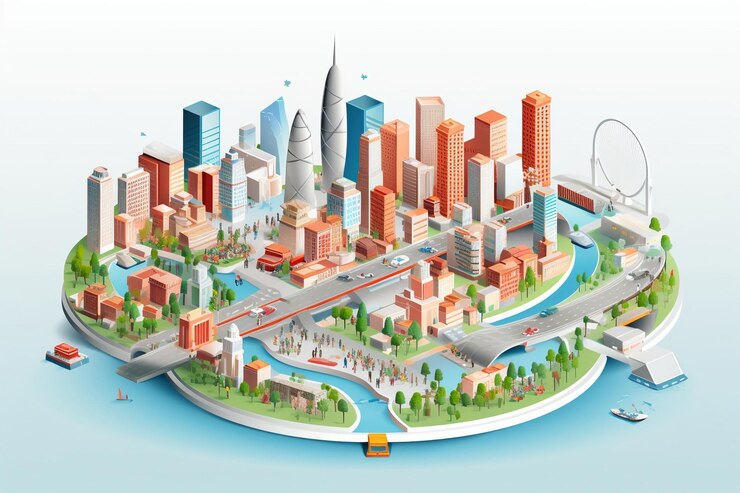In the realm of urban development, the advent of connected cars is poised to revolutionize how we navigate and interact within cities. These technologically advanced vehicles, equipped with sensors, internet connectivity, and sophisticated computing capabilities, are not only transforming transportation but also reshaping the fundamental structure of urbanization itself.
As cities grapple with challenges like traffic congestion, pollution, and infrastructure limitations, connected cars offer a promising solution by introducing unprecedented levels of efficiency, safety, and sustainability to urban environments.
This blog delves into the transformative potential of connected cars in reshaping urbanization, exploring their impact on mobility patterns, infrastructure development, and the overall urban living experience. Discover the future of connected cars at World BI's conferences, "Digital Revolution in Connected Cars" Join professionals and industrialists as we delve into the impact and benefits of this transformative technology.
Connected Cars
- Connected cars refer to vehicles equipped with advanced technologies, such as sensors, internet connectivity, and onboard computing systems.
- These technologies enable communication between the vehicle and external networks, infrastructure, and other vehicles.
- Connected cars can exchange data with each other, with traffic management systems, and with cloud-based services, allowing for improved navigation, real-time traffic updates, remote diagnostics, and enhanced safety features.
Urbanization Trends
- Urbanization trends in vehicles are witnessing a notable shift towards sustainability, connectivity, and efficiency, particularly in urban areas.
- Electric vehicles (EVs) are on the rise, addressing concerns regarding emissions and fossil fuel dependency.
- Concurrently, connected and autonomous vehicles (CAVs) promise safer and more streamlined urban mobility.
- The emergence of shared mobility services and innovative urban delivery solutions further diversifies transportation options while reducing environmental impact.
- Integration with public transit systems and a strong focus on sustainable design highlight the collective effort toward creating more livable cities.
How Connected Cars Reshaping Urban Environment

Connected cars are influencing various sectors within urbanization, reshaping traditional practices, and introducing innovative solutions.
Here are some key sectors impacted by connected cars in urban environments:
Transportation and Mobility:
- Connected cars revolutionize transportation within cities by offering real-time traffic updates, route optimization, and shared mobility services.
- They contribute to reduced congestion, improved traffic flow, and enhanced accessibility, ultimately transforming how people move around urban areas.
Infrastructure Planning and Development:
- The data generated by connected cars provides valuable insights into traffic patterns, parking demand, and road conditions.
- City planners can use this information to optimize infrastructure development, such as road maintenance, traffic signal timing, and the design of transportation networks.
Safety and Emergency Services:
- Through vehicle-to-vehicle (V2V) and vehicle-to-infrastructure (V2I) communication, connected cars enhance road safety by alerting drivers to potential hazards and enabling faster emergency response times.
- Advanced driver assistance systems (ADAS) further improve safety by offering features like automatic emergency braking and lane-keeping assistance.
Urban Governance and Policy Making:
- Connected cars play a role in smart city initiatives by integrating vehicle data with other urban systems, such as public transit, energy grids, and environmental sensors.
- This integration enables better decision-making by city officials, leading to more efficient resource allocation and policy implementation.
Environmental Sustainability:
- By optimizing traffic flow and reducing idling time, connected cars contribute to lower emissions and improved air quality in urban areas.
- Additionally, the integration of electric and hybrid vehicles with connected technology further reduces the environmental footprint of urban transportation, supporting sustainability goals.
Consumer Services and Entertainment:
- Connectivity enables connected cars to access a wide range of personalized services and applications tailored to urban dwellers' needs, including in-car entertainment, navigation assistance, and remote vehicle diagnostics.
- This enhances the overall driving experience and convenience for consumers.
Challenges in Reshaping Urbanization
While connected cars offer numerous benefits for reshaping urbanization, they also face several challenges that need to be addressed:
1. Infrastructure Readiness:
- The effectiveness of connected cars relies heavily on the availability of robust infrastructure, including high-speed internet connectivity, communication networks, and smart traffic management systems.
- In many urban areas, especially in developing countries, the infrastructure may be inadequate or outdated, hindering the full potential of connected car technology.
2. Data Privacy and Security:
- Connected cars generate and transmit vast amounts of data, raising concerns about privacy and cybersecurity.
- Safeguarding sensitive information from unauthorized access and potential cyberattacks is crucial to maintaining consumer trust and confidence in connected car technology.

3. Interoperability and Standardization:
- With various manufacturers developing connected car systems independently, ensuring interoperability and standardization across different platforms and brands can be challenging.
- A lack of standardized protocols may impede seamless communication between vehicles and infrastructure, limiting the overall effectiveness of connected car solutions.
4. Regulatory and Legal Frameworks:
- The regulatory landscape for connected cars is still evolving, with policymakers grappling to establish comprehensive guidelines and standards.
- Issues such as liability in the event of accidents, data ownership, and compliance with privacy regulations present legal challenges that need to be addressed to foster the widespread adoption of connected car technology.
5. Equity and Accessibility:
- While connected cars offer the potential for improved mobility and accessibility, there is a risk of exacerbating existing inequalities.
- Affordability barriers may prevent certain segments of the population from accessing connected car services, widening the digital divide and perpetuating social disparities in urban areas.
6. Cybersecurity Risks:
- Connected cars are vulnerable to cyber threats, including hacking, malware, and ransomware attacks.
- Ensuring robust cybersecurity measures to protect against these risks is essential to prevent malicious actors from compromising the safety and functionality of connected car systems.
World BI Connected Cars Summit
The transformative role of connected cars in shaping the future of urban environments extends beyond mere transportation. It encompasses broader themes of sustainability, equity, and technological innovation, ultimately paving the way toward smarter, greener, and more livable cities. As these technologies continue to evolve and become more widespread, their impact on urbanization will be profound, reshaping the way we live, work, and move within cities.
World BI Group is at the forefront of fostering dialogue and collaboration within the automotive industry by organizing conferences focused on the advancement of connected cars. These conferences serve as platforms for professionals and industrialists to come together, exchange insights, and discuss the impact and benefits of connected car technology. For the latest updates and information about the "Digital Revolution in Connected Cars" Conference, we invite you to visit the World BI website.